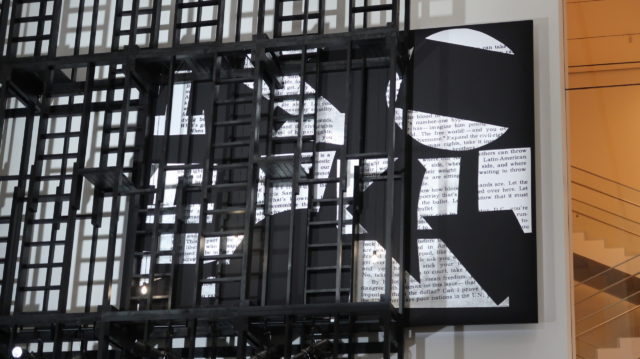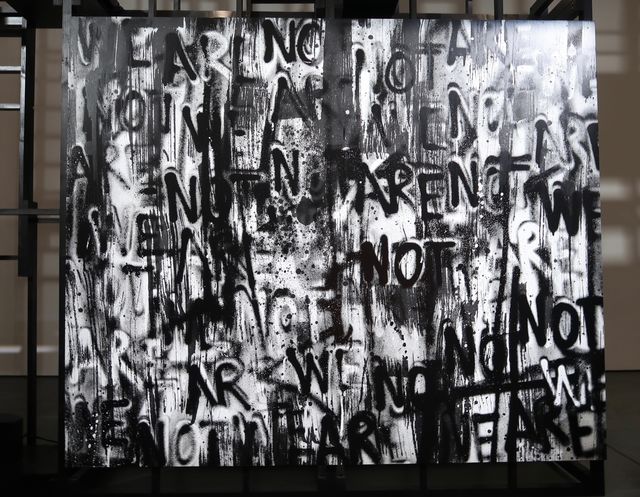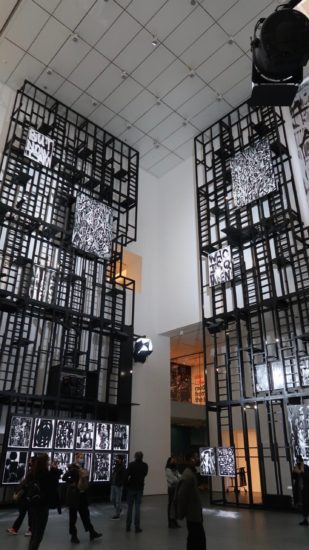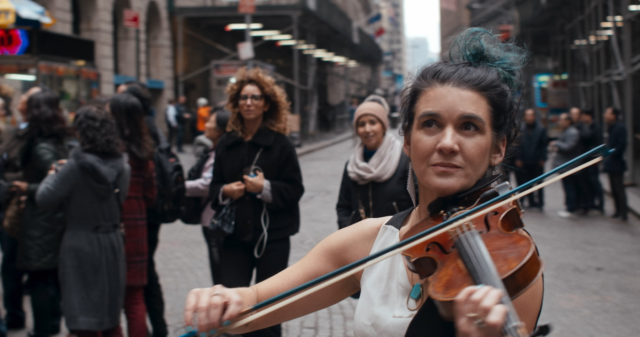
Alicia Jo Rabins offers a public kaddish for Bernie Madoff in new film
THIRTY-FIRST ANNUAL NEW YORK JEWISH FILM FESTIVAL
Walter Reade Theater, Film at Lincoln Center
165 West 65th St. between Broadway & Amsterdam Aves.
January 12-25, $12 virtual (all-access $85), $15 in person (all-access $95)
212-875-5050
www.filmlinc.org
thejewishmuseum.org
The 2022 New York Jewish Film festival goes hybrid this year, with more than two dozen shorts and features exploring Jewish art, history, culture, and politics around the world. Running January 12-25 both at the Walter Reade Theater and online, the thirty-first annual event, a collaboration between Film at Lincoln Center and the Jewish Museum, includes in-person introductions and Q&As for many screenings. The opening-night selection is Mano Khalil’s autobiographical Neighbours, about a six-year old Kurdish boy enamored with the last Jewish family in his village as nationalism and anti-Semitism rise up. The centerpiece is Kaveh Nabatian’s Sin La Habana, dealing with cross-cultural relationships in Cuba. And Aurélie Saada’s Rose closes things out, a tale about a suddenly widowed woman, played by French legend Françoise Fabian, who has to reevaluate her future as she approaches her eightieth birthday.
In addition, there will be a special tribute to film scholar, author, archivist, educator, activist, filmmaker, and independent distributor Pearl Bowser, with virtual screenings of Lloyd Reckord’s 1963 short Ten Bob in Winter and Oscar Micheaux’s 1925 classic, Body and Soul, along with a ten-minute November 2021 interview with Bowser at the Jewish Museum reflecting on the 1970 exhibition she curated there, “The Black Film.”
A KADDISH FOR BERNIE MADOFF (Alicia J. Rose, 2021)
Walter Reade Theater, Film at Lincoln Center
Monday, January 17, 1:00 & 7:00
www.filmlinc.org
www.akaddishforberniemadoff.com
I kicked myself when I missed Alicia Jo Rabins’s one-woman show, A Kaddish for Bernie Madoff, when it debuted at Joe’s Pub in 2012. I had seen her play with the klezmer band Golem and had wanted to see the song cycle live. She released the album in 2014, but now she has collaborated with director and photographer Alicia J. Rose on a delightful, kooky film version, playing at the New York Jewish Film Festival on January 17 at 1:00 and 7:00, with Rose, Rabins, and producer Lara Cuddy at the Walter Reade Theater for postscreening Q&As.
Rose follows Rabins as she becomes endlessly fascinated with the story of Bernie Madoff, the financier who built an elaborate Ponzi scheme over forty years, bilking nearly five thousand clients out of billions of dollars. Rabins, in the midst of an arts residency in a Financial District office tower while earning money by teaching bat mitzvah girls how to chant from the Torah, spoke with numerous people impacted by Madoff’s fraud, from a credit risk officer (her mother’s college roommate), a whistleblower, and an FBI agent to a therapist, a lawyer, and a Buddhist monk.
“I wasn’t just obsessed with Bernie Madoff; I was obsessed with anyone who had a connection to him, and they kept coming, one after the other,” Rabins says in the film. “I interviewed them, went back to my studio, and turned their stories into songs. I was being sucked deeper and deeper into my obsession.”
Each song is its own set piece in a different space, with Rabins dressing up like the person (her wigs are particularly fun while evoking the work of Cindy Sherman) and detailing how they were affected by Madoff’s scheme in such pop tunes as “Due Diligence,” “No Such Thing as a Straight Line,” “Down on the Seventeenth Floor,” “My Grandfather Deserted the Czar’s Army,” and “What Was the Pathology There?” She is occasionally joined by members of her band (drummer David Freeman, cellist Jennifer Kersgaard), meets a couple of yentas by a Palm Beach pool (Robin McAlpine and Judy Silk), participates in synchronized swimming, and considers holding a ritual excommunication. “I hated thinking about Madoff as a Jew. I mean, he’s pretty much the definition of bad for the Jews,” she opines. She’s not the only one to feel that way.
A Kaddish for Bernie Madoff is a great fit for the festival because it is not only about Judaism but also about New York City, shot on location in and around Wall Street, the Lipstick Building in Midtown, the Williamsburg Bridge, and other familiar spots. There is cool animation by Zak Margolis and several Golem songs in the background as Rabins relates her life and art to Madoff’s legacy, incorporating what she refers to as a kabbalistic interconnectedness and a “messianic idea of perfection.” She questions the entire financial system as she explains, “Very few people knew he was just making shit up.” And she admits that “confronting Bernie was confronting myself.” You’re bound to connect with this film in more ways than you might think.

Documentary short explores little-known legacy of Poland-born Brooklyn artist known as Tania (© 2020 Rima Yamazaki)
SHORT FILMS ON CREATIVITY: UNTITLED (TANIA PROJECT) (Rima Yamazaki, 2020)
Available virtually January 20-25
www.filmlinc.org
rimayamazaki.com
In the fall of 2017, filmmaker Rima Yamazaki was invited by Ranger Mills, the widower of the late artist Tania Milicevic, to explore her legacy. Yamazaki, who has made previous films about still-life painter Ellen Altfest, on-site painter Rackstraw Downes, photographer James Casebere, and multimedia icon Joan Jonas, had never heard of Tania, but she took on the project, doing a deep dive into her work, which included painting, sculpture, collage, and public installations.
Yamazaki went through Tania’s letters, official documents, press clippings, family photographs, exhibition brochures, and personal writings to form a compelling portrait of the little-known artist, whose large-scale murals can still be seen at the corner of Mercer and Third St. in Manhattan (from 1970) and at 10 Evergreen Ave. in Brooklyn (1967), in addition to a Torah ark she designed for Tribeca Synagogue (1967). Tania was also an early feminist with intriguing statements about life and art — she favored geometric abstract patterns in multiple colors — that Yamazaki types out on the screen.
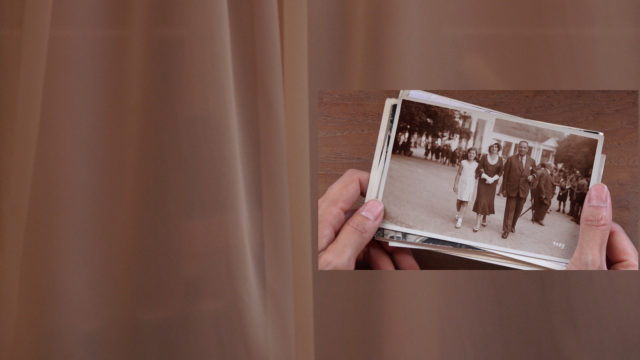
Rima Yamazaki uses split screens to explore the legacy of Tania (© 2020 Rima Yamazaki)
“I had four husbands . . . but I don’t think I’ve ever been married,” Tania, who was born Tatiana Lewin in Łódź, Poland, in 1920, wrote. “I want to escape gravity and the surfaces that prevent us from feeling our weight — Can we understand what we cannot feel?” she jotted down. And: “I never know what the art world is talking about. . . . I hope they do.”
Yamazaki visits the sites of Tania’s work while also going through her old studio. She uses split-screens to show photos of Tania’s oeuvre, including slides taken by Joel-Peter Witkin, known for his depictions of corpses and grotesque figures. We learn about the Construction Process Environment that Tania and Nasson Daphnis were commissioned to design in 1971 at 1500 Broadway in Times Square as well as her plans for city rooftops, which was left unfinished after her death from cancer in 1982. Yet we never see or hear Tania speak, or see others talk about her. It’s an intensely personal journey for Yamazaki, who shares only select tidbits.
The twenty-five-minute documentary will be available virtually January 20-25 as part of the New York Jewish Film Festival program “Short Films on Creativity,” which also includes Cynthia Madansky’s AA (about poet and photographer Anna Alchuk), Yoav Potash’s Beregovsky #136 (about folklorist Moshe Beregovsky), Asali Echols’s The Violin Upstairs (about the filmmaker’s violin), Eli Zuzovsky’s Mazel Tov (about Adam Weizmann’s wartime bar mitzvah), and Adrienne Gruben’s Lily (about comic-book artist Lily Reneé).

